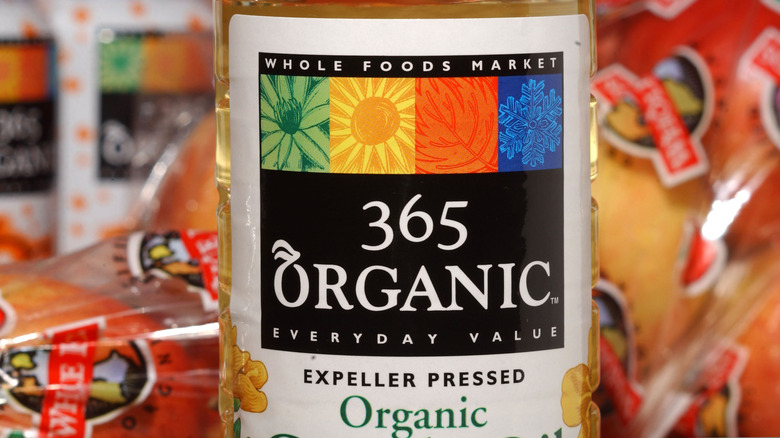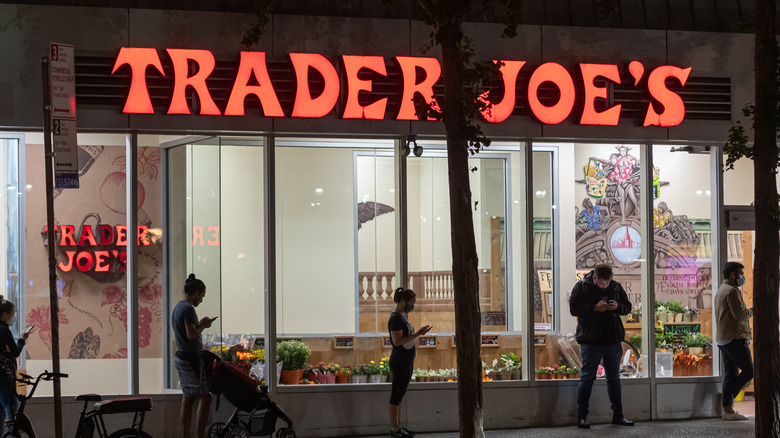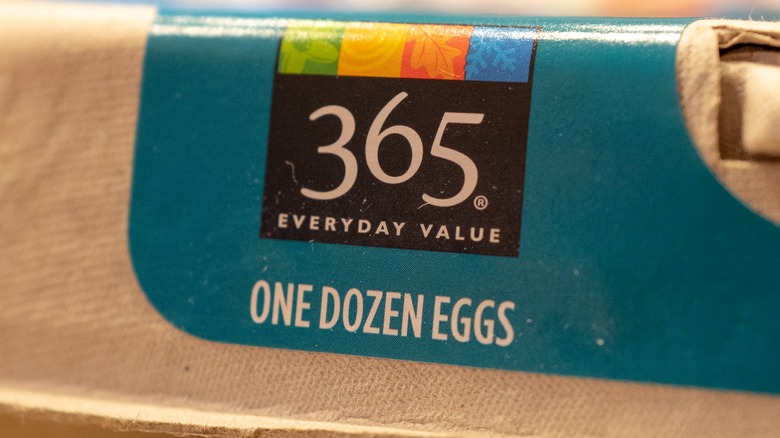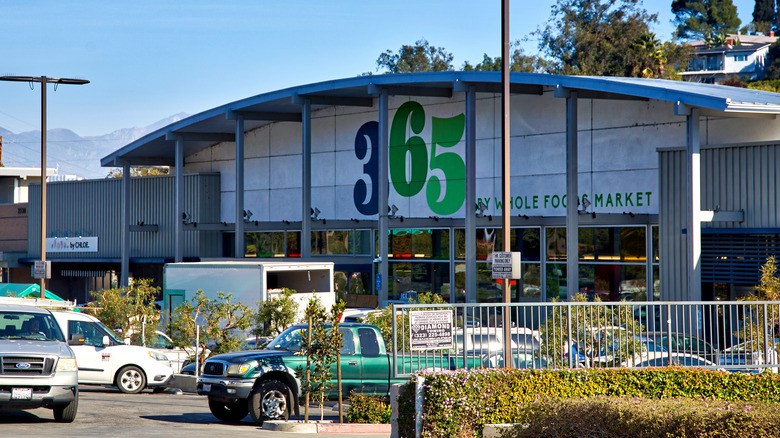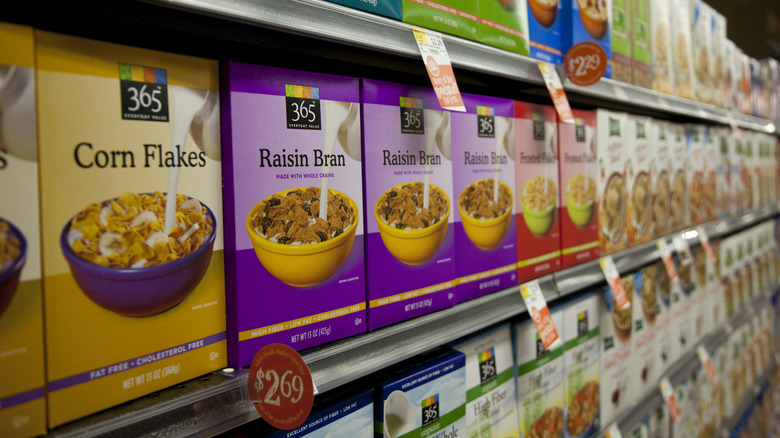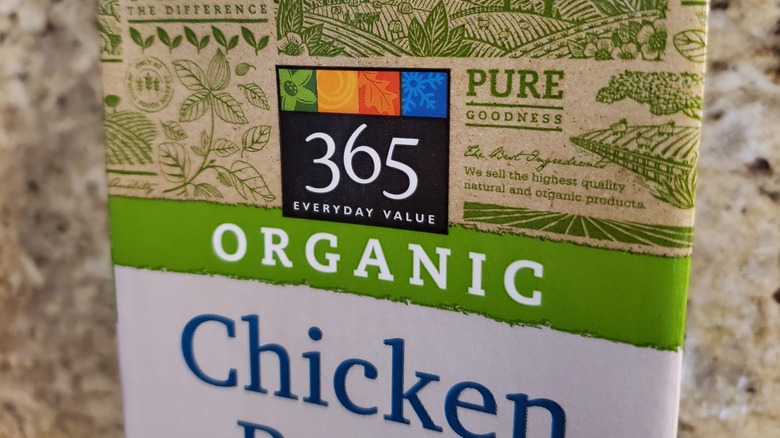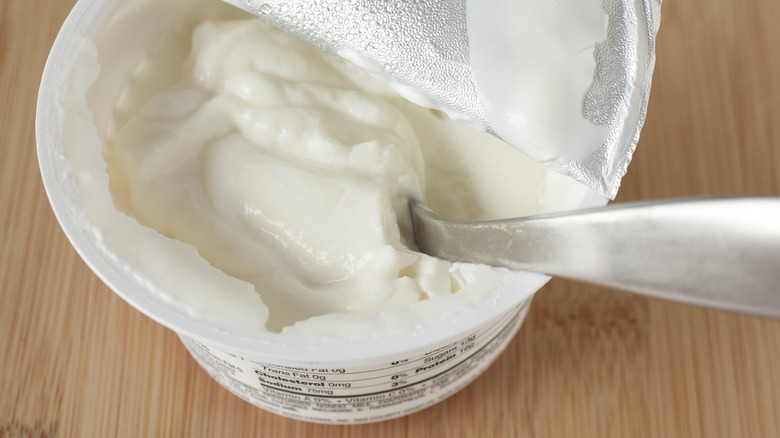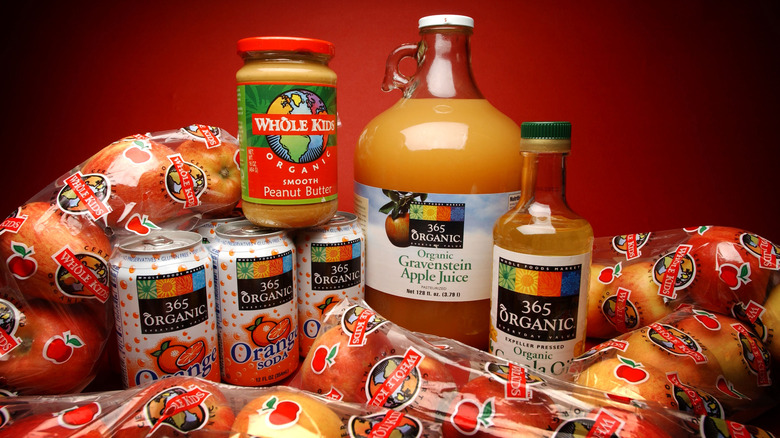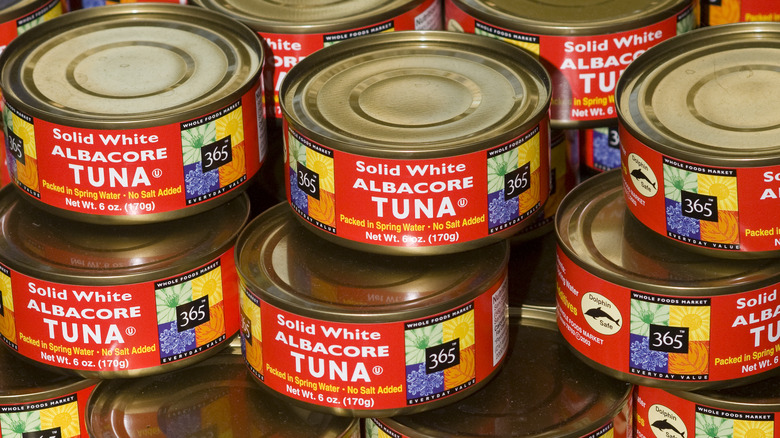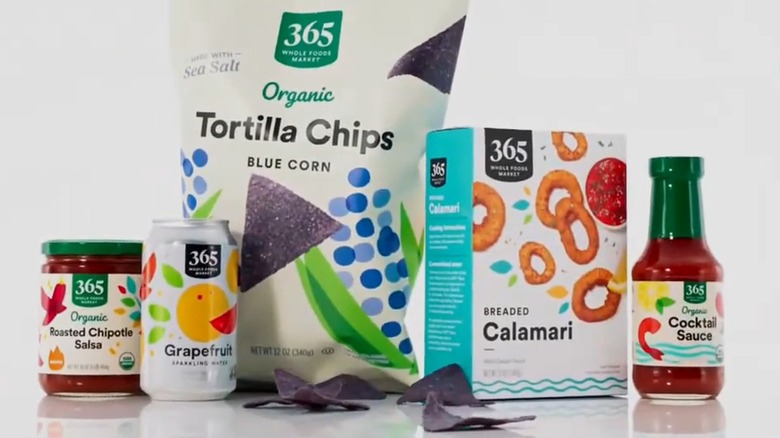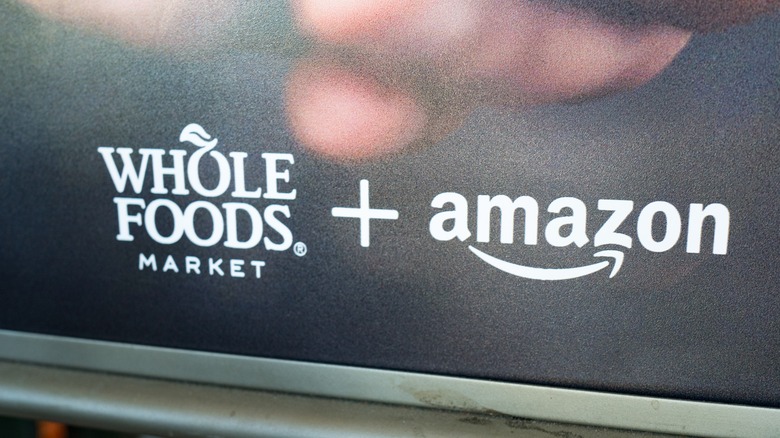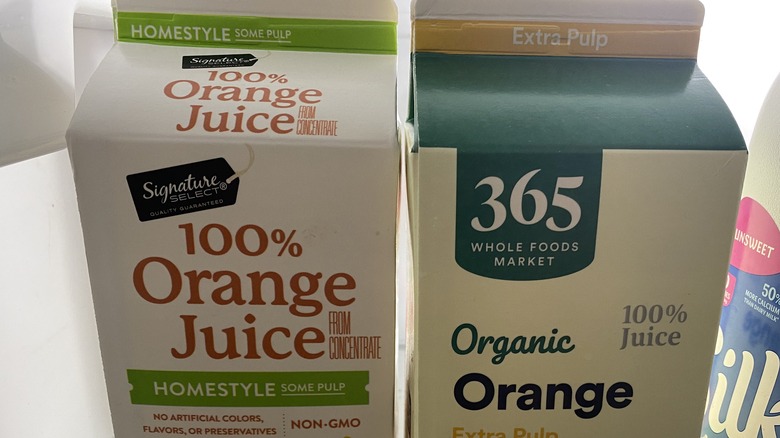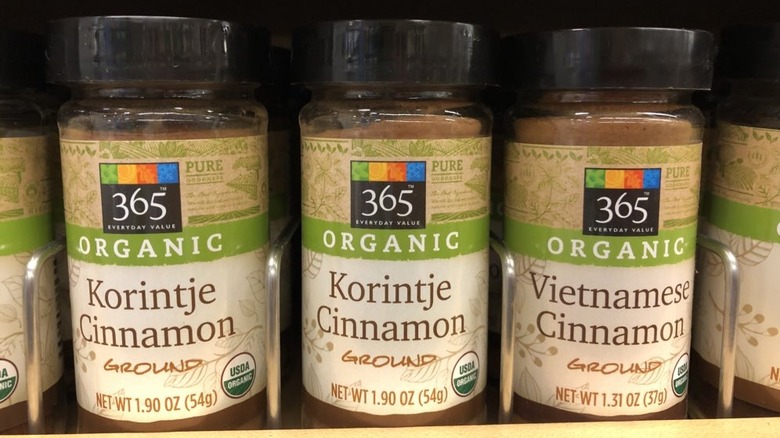12 Facts Behind Whole Foods' 365 Brand
Whole Foods is widely known as one of the best places to acquire organic, high quality, and consciously produced groceries — but really expensive ones, too. Setting and maintaining a high standard in its supply chain is complicated and costly, and Whole Foods passes that expense on to customers, except when it doesn't — with its 365 By Whole Foods Market products.
Like most every other big national chain, Whole Foods has an umbrella name for its line of house-branded generic merchandise, with the "365" name stamped on hundreds of packaged, fresh, and frozen foods along with personal care items and housewares. On the other hand, the 365 By Whole Foods Market label suggests the food or sundry inside is anything but generic. It's more of a seal of quality, an assurance to customers that the product meets the store's exacting benchmark for quality, healthiness, and earth-friendliness. Such items rank among the things one should and shouldn't buy at Whole Foods.
The line has proven popular and successful with Whole Foods customers, and it can compete with most national brands sold across the retail spectrum. Here's a look into the history, meaning, and behind-the-scenes controversies involving 365 By Whole Foods Market.
It was a response to Trader Joe's
Whole Foods' close competitor and corollary is Trader Joe's, another mid-size grocery chain that presents itself as a purveyor of minimally processed, wholesome-seeming products. Trader Joe's, which is better than Whole Foods for multiple reasons, almost exclusively sells products via its private, store brands and can do so at less cost to customers, giving it an edge over Whole Foods in terms of price and perceived value. And that's what prompted Whole Foods to launch its 365 By Whole Foods Market line. "It's natural products at lower prices," Peter Roy, then president for Whole Foods, told Supermarket News in March 1997 when announcing the debut of what at the time was called simply 365.
At first, the two main distinctions between 365 and the pre-existing Whole Foods store brand was that the new line would not include certified organic products and that prices would average about 20% less than those offered under the Whole Foods banner. 365 was tested at Whole Foods' flagship stores in its home town of Austin, Texas, before it was rolled out nationwide. In that first year, around 100 products with the 365 label hit shelves, with a goal of eventually selling up to 700.
The name has a lot of meaning
When announcing the launch of 365 in 1997, Whole Foods insisted that any and all organic store-brand products would remain under the purview of its titular house label. But the chain quickly changed course. Whole Foods purports itself to be the nation's first certified organic grocery store, although not every one of its 365 by Whole Foods Market products has achieved that distinction and certification.
But the promise of organic or organic-adjacent is conveyed through the line's name and logo. The "365" indicates the number of days in a standard calendar year, and 365 By Whole Foods Market suggests to customers that they may find healthy and organic foods every day of the year there — or all the time. In keeping with the idea that 365 By Whole Foods Market items are meant for casual and consistent consumption, the foods bearing that name are much more affordably priced than similar ones sold by name-brand manufacturers at other stores or even elsewhere in Whole Foods.
A 365 By Whole Foods Market retail spinoff didn't last
Eighteen years after launching its store brand of discounted natural products, Whole Foods executives theorized that the 365 line was so successful that it could support itself. In 2015, Whole Foods created a spinoff, mini-chain of grocery stores called 365 By Whole Foods Market. It sold only the products bearing that corporate imprint, and it was designed to "help meet the exploding demand for more natural and organic foods," the parent company announced in a press release.
But while the product line 365 By Whole Foods Market was a rousing success, the collection of stores bearing that same name was a flop. In February 2019, less than four years after opening the smaller but distinctive 365 By Whole Foods Markets, all 12 closed and were quickly converted into compact-sized but full-fledged Whole Foods stores. The main reason for the closure: Amazon bought the entire Whole Foods enterprise and made so many price changes to the grocery chain that the spinoff was deemed unnecessary. "When we launched our Whole Foods Market 365 stores, the intention was to create a more value-focused and streamlined shopping experience," Whole Foods chief executive officer John Mackey said in an employee communique in 2019 (via Supermarket News). "However, as we have been consistently lowering prices in our core Whole Foods Market stores over the past year, the price distinction between the two brands has become less relevant."
Outside companies make 365 products
A supermarket chain's "private label" is just that — the company puts its full name or one of its trademarked, company-specific brands on the packaging of a product that it has agreed to distribute. Also called a store brand or generic, most every big retail food concern offers these cheaper-than-name-brand products — Costco has its Kirkland, Safeway has its Signature lines, and Whole Foods sells 365 By Whole Foods Market foods and personal care products.
There are so many 365 products currently or historically produced — around 3,500 as of 2023 — that it would represent a massive manufacturing undertaking for Whole Foods to devise, make, package, and sell all of its self-labeled merchandise. Instead, the chain contracts with numerous suppliers. Companies in the business of making one type of food in particular partner with Whole Foods, with its exacting and agreed-upon parameters, to produce the 365-labeled items. Whole Foods the corporation, however, is sworn to secrecy about which other companies make exactly which products for the 365 By Whole Foods Market brand.
The products are subject to strict rules
For a product to be accepted by Whole Foods and enrolled in its 365 By Whole Foods Market store-brand program, it must first pass a number of tests and receive approvals of various kinds from internal and external bodies. For example, if the potential 365 By Whole Foods Market item is found to have utilized animal testing in its development phase, it won't be accepted as a private label item. That's especially pertinent for personal care products. The 365 By Whole Foods Market line maintains a deep aversion to animal testing. Not even an ingredient in a 365 By Whole Foods Market product can bear a history of animal testing, nor can the outside supplier who makes the item employ such practices.
But while 365 By Whole Foods Market products can purport to be cruelty free, there's no official, legally binding certification of the claim. However, the strict guidelines of Whole Foods overall do require 365 By Whole Foods Market products to abide by several rules. Foods with the 365 label don't and won't contain additives including monosodium glutamate (MSG), high fructose corn syrup, hydrogenated oils, or aspartame.
Whole Foods' 365 Greek yogurt had a bad label
Just because a food distributor prints something on its products' packaging doesn't necessarily mean it's accurate. In July 2014, Consumer Reports took Whole Foods to task when it discovered that a 365 By Whole Foods Market product boasted nutrition stats that were too good to be true. The nonfat plain Greek yogurt (a secret ingredient in plenty of recipes) listed its sugar content as 2 grams in an 8-ounce serving. All the other brands that Consumer Reports examined contained between 5 and 10 grams of sugar in a similar serving size, making the 365 yogurt a more nutritionally attractive option. But Consumer Reports' scientific testers discovered that an 8-ounce serving of the 365 yogurt provided around 11.4 grams of sugar.
When reached for comment by Consumer Reports, Whole Foods pointed to its yogurt supplier, saying in a statement: "We are working with our vendor to understand the testing results you have provided. They are not consistent with testing results we have relied upon from reputable third-party labs. We take this issue seriously and are investigating the matter, and will of course take corrective action if any is warranted." Nevertheless, weeks after the sugary exposé, Whole Foods found itself at the center of several lawsuits over the allegedly fraudulently labeled yogurt. In 2016, a judge dismissed the consolidated case, one of the more concerning grocery store scandals in recent history.
365 By Whole Foods boasts an ever-growing lineup
The 365 By Whole Foods Market array of products started to arrive at Whole Foods stores in 1997, with an initial collection of about 100 items. By 2023, that number had exploded, with Whole Foods introducing around 3,500 individual items through its private label. At any given time, several hundred 365 By Whole Foods Market products are on offer, many of which can be shipped nationwide through Amazon.
An Exclusive Brands team employed by Whole Foods, composed of buyers, nutritionists, food scientists, and other experts, decides just what products will make it into the 365 lineup — and from whom and where the grocery chain will source those products. (Whole Foods eagerly seeks out the advice of specialists — for example, the company has an Extra Virgin Olive Oil Associate Savante with proven skills in tasting olive oil on its payroll.) A Trends Council especially comes into play here. Whole Foods looks at where food is headed around the country and around the world, anticipating customers' demands so that they may greet them head on with supply, often under the affordably priced 365 By Whole Foods Market label to boot.
Not Every 365 product lasts for even 365 days
The stated and implied purpose of the 365 By Whole Foods Market store brand is to provide reliably value-priced, quality merchandise every day of the year. Whole Foods doesn't always follow that philosophy to the letter, though. The 365 By Whole Foods Market product line is forever in flux, with items moving in and out of stores and thus not quite available all the time, any time.
With thousands of products bearing the signage over the years, a Whole Foods store doesn't have the space to permanently stock every 365 item, and the chain regularly discontinues its merchandise for various reasons — to the chagrin of some of its customers. The Organic Sweet Carrot Ginger Miso Dressing disappeared from shelves, as did the vegan Chickenless Nuggets. Whole Foods also uses the 365 name to introduce seasonal or limited-edition products. Some of those may return year after year, and some make a brief appearance on the shelves before disappearing altogether. Among the 365 shopper favorites not available every day at the average Whole Foods: Chocolate Candy Cane Sandwich Cremes, Pumpkin Ice Cream Sandwiches, Blue Cheese and Garlic Flavored Popcorn, and Dill Pickle Almonds.
It underwent a major rebranding
For the first 20-plus years of its existence, 365 By Whole Foods Market items carried a logo and a tagline that emphasized their unpretentious inexpensiveness — four colored panels with iconography pertaining to each of the four seasons (comprising a year, or 365 days) and the generics-suggesting slogan "Everyday Value." In 2020, Whole Foods thought it was time to give the look and angle of its premium store brand a refreshing makeover. After consulting with consumer research group IGD, it made some big changes. Gone was the graphical, colorful overlay in favor of a simple black or green label and the words "365 Whole Foods Market" rendered in white. The concept of a tagline was dropped entirely.
The changes took place following Amazon's acquisition of Whole Foods and following the closure of the 365 By Whole Foods Market standalone store experiment. After that branding error, Whole Foods changed the entire 365 look to move on from the era of the spinoff chain and announced the revamping in stores with shelf tags that read, "the quality you love has a fresh new look!"
365 By Whole Foods is a big part of Amazon's future plans
In 2017, Amazon completed its purchase of Whole Foods Market, dropping $13.7 billion on the deal. Not wishing to merely add the retail grocery brand to its portfolio of divisions, Amazon plans to use the existing branding and infrastructure of the well-known national company to bolster its burgeoning grocery delivery business. The line of 365 By Whole Foods Market products represents a significant part of the online seller's plans to ship groceries the way it ships most everything else — directly to customers. In August 2023, Amazon made an aggressive push into online grocery with the announcement that more than 600 of its 365 By Whole Foods Market products would be instantly available on Amazon.com for shipping anywhere in the United States. That's only a fraction of the entire 365 line, and those are mostly non-spoilable foods and non-food items.
In many cases, the 365 By Whole Foods Market versions of a product were made available for Amazon's Subscribe and Save program, which provides discounts of up to 15% to customers who sign up for automatic monthly ordering of household goods. The 365 program is the store brand of Whole Foods, and it's increasingly that of Amazon's food sector as well.
The products are just as good or better than the competition's
Store-brand products don't usually rate very highly when it comes to taste or overall quality. In fact, mediocrity or being just okay is something customers come to expect when they choose generics — which isn't always the best decision — over name-brand items. It's a choice usually based almost entirely on price. And yet, foods of all kinds marketed under the 365 By Whole Foods Market private label name, routinely and surprisingly, win praise and accolades from the experts. In a survey of various store-brand products in 2022, Consumer Reports found 365 By Whole Foods Market tomato ketchup to have a unique flavor profile that was superior to the Trader Joe's house brand organic entry. The magazine also cited 365's organic brand frozen mixed vegetables to have the best taste, and it appreciated the no-sugar-added approach of the line's creamy peanut butter (a staple that can be used in a number of interesting ways).
In November 2023, Consumer Reports rated and ranked several widely and nationally available whole frozen turkey brands. 365 By Whole Foods Market's organic young turkey, perfect for matching with unexpected sides, easily won out, taking the No. 1 spot on most of the critics' rankings, outperforming the likes of Butterball and Member's Mark.
Whole Foods got sued over 365 spices
In 2021, Consumer Reports conducted a safety test on mass-market dried spices and herbs. After examining 126 products from national name brands and grocery chains' private labels, including some by 365 By Whole Foods Market, researchers found that 40 of the individual samples tested positive for toxic metals including cadmium, lead, and arsenic. Not only should there be little to none of those things in dried and powdered spices, but the presence of metals was also high enough to negatively impact the health of children and some adults who may regularly consume those products. The 365 By Whole Foods Market products with troubling amounts of the metals included ground cumin, ground ginger, and basil.
After the release of the Consumer Reports findings, a group of attorneys filed a class action lawsuit in federal court in Washington state. Naming Whole Foods Market and its parent company, Amazon.com, the suit attempted to get financial damages for those who suffered from eating the arsenic and lead-laced 365 By Whole Foods Market spices.
